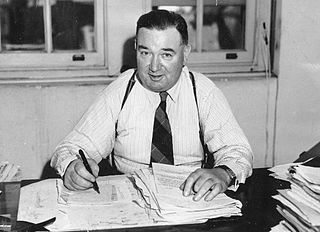
The Australian waterfront dispute of 1998 was an event in Australian industrial relations history, in which the Patrick Corporation undertook a restructuring of their operations for the purpose of dismissing their workforce. The restructuring by Patrick Corporation was later ruled illegal by Australian courts. The dispute involved Patrick Corporation terminating the employment of its workforce and locking out the workers of the workplace after the restructuring had taken place, with many of these workers members of the dominant Maritime Union of Australia. The resulting dismissal and locking out of their unionised workforce was supported and backed by the Australian Liberal/National Coalition Government.

The National Union of Seamen (NUS) was the principal trade union of merchant seafarers in the United Kingdom from the late 1880s to 1990. In 1990, the union amalgamated with the National Union of Railwaymen to form the National Union of Rail, Maritime and Transport Workers (RMT).
The Amalgamated Marine Workers' Union (AMWU) was a trade union of sailors, firemen and ship-board service personnel which existed in the United Kingdom between 1922 and 1927.
Rowan Cahill is an Australian historian and journalist, with a background as a teacher and farmhand, who variously worked for the trade union movement as a rank and file activist, delegate and publicist.

The Maritime Union of Australia (MUA) was a union which covered waterside workers, seafarers, port workers, professional divers, and office workers associated with Australian ports. The MUA was formed in 1993 with merger of the Seamen's Union of Australia and the Waterside Workers' Federation of Australia.
Eliot Valens Elliott, also known as Vic Elliott, was a trade union leader of the Seamen's Union of Australia (SUA) from 1941 to 1978.

Tasnor Ivan "Tas" Bull was an Australian trade union leader, serving as General Secretary of the Waterside Workers' Federation from 1984 to 1993.
The Myanmar Maritime Trade Unions Federation, formerly known as Seafarers Union of Burma (SUB) is a trade union in Myanmar. It represents an estimated 20,000-30,000 workers in the international shipping industry, many of whom work on Flag of Convenience ships and suffer from poor work and pay conditions.
Firemen and Deckhands' Union of New South Wales (FDU) was an Australian trade union existing between 1901 and 1993. The union covered deckhands employed on ferries, tugs, launches, lighters and hoppers, as well as enginemen, wharf hands, turnstill hands, change hands, firemen, motorboat coxmen and assistants. The FDU operated a closed shop, with all labour in the industry provided to employers through the union.
Federated Marine Stewards and Pantrymen's Association of Australasia was an Australian trade union established in 1884, and existing as a federal union from 1909 to 1988. The association represented marine stewards and stewardesses, marine pantrymen and crew attendants. The union operated a closed shop, with all workers employed in the industry members of the union, and operated on a 'no OK card - no job' principle.
Marine Cooks, Bakers and Butchers' Association of Australasia was an Australian trade union. It was formed in Melbourne in August 1907 as a breakaway group from the Federated Stewards and Cooks' Union of Australia and was registered under the Commonwealth Conciliation and Arbitration Act 1904 in January 1908 and affiliated with the Trades and Labour Council in April 1908. The Association represented workers employed as cooks, bakers, butchers and other food preparation roles aboard ships in Australia and New Zealand. In November 1908 Mr Justice Higgins issued a judgement on rates of pay and hours for marine cooks in a case involving the Association and the Commonwealth Steamship Owners' Association. The Association moved its Head Office moved from Melbourne to Sydney in January 1915.

James "Big Jim" Healy was an Australian trade unionist and communist activist. Healy served as General Secretary of the Waterside Workers' Federation of Australia from 1937 to his death in 1961, a period when the union recovered from its defeat in the 1928 waterfront strike to become one of the most powerful trade unions in Australia. Healy was one of the most prominent public representatives of the communist movement in Australia during the Cold War.
Professional Divers' Association of Australia was an Australian trade union which existed between 1969 and 1991. The union had coverage of all workers employed underwater in Australia, principally as professional divers.

Padraig "Paddy" Crumlin is an Australian trade unionist. In addition to his leadership of the Maritime Union of Australia since 2000, he has been the President of the International Transport Workers' Federation (ITF) since 2010 and the International President of the Construction, Forestry, Maritime, Mining and Energy Union since that union was established in 2018.

The Waterside Workers' Federation of Australia (WWF) was an Australian trade union that existed from 1902 to 1993. After a period of negotiations between other Australian maritime unions, it was federated in 1902 and first federally registered in 1907; its first general president was Billy Hughes.

The Black Armada was a name applied to Dutch merchant and military vessels which were prevented from sailing to the newly proclaimed independent Indonesia from Australian ports due to waterfront strikes or 'black bans' by maritime trade unions from 1945 to 1949.
Rupert Ernest Lockwood was an Australian journalist and communist activist.
The Dalfram dispute of 1938 was a political industrial dispute at Port Kembla, New South Wales, protesting the export of pig iron from Australia to Japan during the Second Sino-Japanese War. It became famous for providing the nickname of Pig Iron Bob to Attorney General Robert Menzies, later to serve as Prime Minister.
Della Elliott was an Australian trade unionist.








